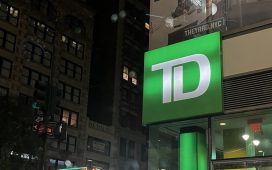Barclays chief executive CS Venkatakrishnan will next week attempt to fulfil a promise his predecessor made to shareholders eight years ago: that a future with the UK bank is a bright one.
The lender, the last European player of any size on Wall Street, will on Tuesday deliver its first major update on strategy since March 2016, when the questions it faced were eerily similar. Then, the board had just fired a chief executive who wanted to cut the investment bank to the bone and installed Jes Staley.
Staley, an acolyte of Jamie Dimon at JPMorgan, did the opposite, retreating from Barclays’ centuries-old presence in Africa and shutting much of its Asia operations in order to build a “bulge-bracket, transatlantic investment bank”.
The intervening years have seen a vast expansion of the trading division, with the investment bank capturing significant market share amid the retreat or demise of its main European rivals.
Yet investors remain unimpressed. Barclays shares closed at 147 pence on Friday, down from the 158p when Staley delivered his strategy update.
“Eight years is a long time in corporate life, especially for a period hardly notable for its success,” said one former executive at the bank.
The moribund share price performance underlines the high stakes for CEO CS Venkatakrishnan — known as Venkat — who must convince sceptics of the value of a business model largely unchanged from the one he inherited from his mentor Staley.
The 58-year-old, who was treated for cancer last year, must do so against the distracting backdrop of Staley fighting a lifetime ban from financial services in the UK after regulators said he misled them over his relationship with deceased paedophile, Jeffrey Epstein.
Barclays has resolved not to cave to critics who want to see the volatile and low-returning investment bank shrunk. Instead, Venkat will outline plans to grow other divisions such as the UK retail business, take more risk in credit cards and boost wealth management, the FT reported in November.
Barclays made a start on rebalancing earlier this month when it agreed to buy UK supermarket Tesco’s banking business for £600mn, adding £8.3bn of credit cards and unsecured personal loans.
The bank will also pledge to cut as much as £1bn in costs and has already said that it removed 5,000 roles in 2023 through attrition, a hiring freeze and redundancies, in particular at its back office support operations and UK unit.
“Barclays has traded at a material discount to tangible book for over a decade,” said JPMorgan analyst Raul Sinha, referring to the stock’s almost 60 per cent shortfall to the book value of its assets. “We don’t expect revolutionary changes to strategy, but believe Barclays’ evolution under Venkat can reset the medium-term investment case positively.”
“However, we acknowledge that plenty of investors are likely to be unmoved unless there is a deeper strategic rethink around capital allocation,” he added.
The corporate and investment bank dominates the debate because it has grown to dwarf the rest of the group. It accounts for £219bn in risk-weighted assets, up from £122bn at the end of 2014, and compared with £73bn at the UK retail bank and £40bn at the cards and payments unit.
While Venkat has opted for evolution, more radical options had been on the table.
The FT reported that Venkat hired Boston Consulting Group to help map out different paths for the lender — under the project code name “Minerva”, the Roman goddess of wisdom. These included cutting the risk-weighted assets allocated to the trading business by 25 per cent, closing businesses such as cash equities or municipal bond trading or even raising capital to buy a sizeable wealth or asset management business.
While it has been spared deep cuts, the investment bank has not escaped scrutiny in efforts to revive Barclays’ share price.
The division has been told by the board to produce more intelligible and granular disclosure on its earnings and come up with a plan to generate a consistent return on tangible equity of 14 to 15 per cent, from the current 11.5 per cent.
That would require operating costs to fall sharply as a percentage of income from about 65 per cent to a mid-50s per cent ratio.
Thousands of less valuable clients will also be culled to focus on the most profitable institutions segmented into diamond, platinum and gold bands by Barclays’ “Hector” management system, the FT has reported.
“What should be clear is that this division is a hot topic for investors. Clarity on strategy, capital consumption and returns is needed at the update on 20 February,” said Jefferies analyst Joseph Dickerson. “The CEO has sent some mixed signals” in recent interviews.
The strategic update will come alongside its fourth-quarter results, which are expected to show the bank slumped to a net loss of £123mn, largely because of steep restructuring costs. Analysts estimate that revenue will fall to £5.8bn, a modest drop from the same period a year earlier.
The bank is also poised to reveal a second straight brutal bonus round after one of the worst years for dealmaking in a decade, following a 3 per cent fall in the overall pool in 2022. According to two people familiar with the matter, many staff will receive zero bonus — a “doughnut” in industry argot. One senior manager described morale as the “darkest since 2008” in the banking division.
A sweetener that Venkat will offer investors will be a more concrete commitment to capital returns. A boost in net interest earnings from the swift series of global interest rate rises over the past 18 months has left Barclays with headroom on its capital buffers for stock buybacks and more generous dividends.
“Whilst Barclays valuation has seemed like a persistent curse, we regard it as more of a gift into February’s update,” said Dickerson. He models £2.2bn of buybacks in both 2024 and 2025 and added “if management can convince on these fronts, the shares should have broad appeal”.
But with Barclays’ share price down by over a quarter since Venkat started in November 2021, there is still plenty of scepticism. In December, Barclays’ second-biggest shareholder, Qatar’s sovereign wealth fund, sold half of its stake worth £510mn.
When Staley took the stage in early March 2016 to insist that the “future is bright”, the shares dropped as much as 11 per cent on the day. “Look at your stock price and what it is telling you is, no one is believing your ‘jam tomorrow’ story,” said one analyst at the time.
Venkat will be hoping for a better reception.




